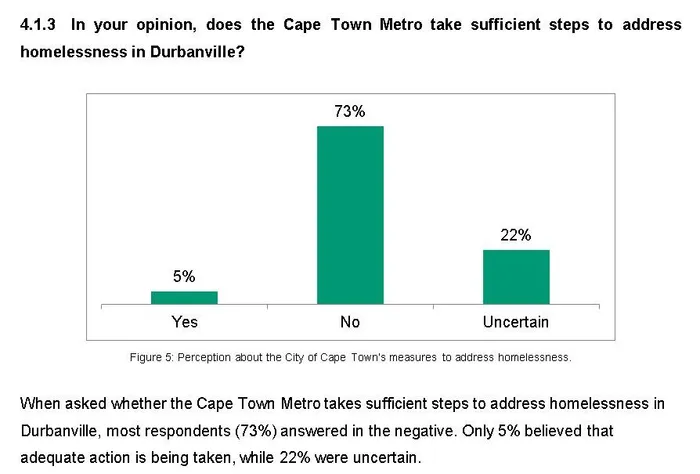Durbanville residents voice concern about homelessness in local survey

Results of the survey on the perception about the City of Cape Town's measures to address homelessness.
Image: Supplied
Following concerns raised by Durbanville residents in a survey about homelessness, a monitoring report from the Durbanville CBD Neighborhood Watch obtained by Northern News showed that there is progress in solving the issue in the Durbanville CBD.
AfriForum, a civil rights organisation that conducted the survey, received responses from 294 participants that aimed to gain insights from the views of the residents on homelessness, its effects, and how the municipality’s response to this issue is perceived.
It was conducted between June and July 2025.
A notable 73% of respondents felt that the City of Cape Town has not done enough to address homelessness in Durbanville, though only 5% felt that sufficient action was being taken.
The civil rights organisation also believed that “there is still much more” that can be done to improve the situation.
In response to the questions from Northern News, the City said it currently runs shelters for the homeless with over 1,000 beds across its hubs, and plans are in place to expand them, which is coupled with working in partnership with non-governmental organisations to rehabilitate and reintegrate the homeless.
The City further said that over 5,000 people were helped off the streets in the last financial year, compared to 4,409 the previous financial year, through shelter placements, reunifying with families, and other forms of reintegration.
“We recognise that not everyone is aware of these interventions and we are working on more proactive communication in this regard,” the City said.

Earle Jansen, manager of the Durbanville MES Safe Space, said they engage often with potential clients who visit their centre for a meal, to inform them of their services and how they can be of benefit to them, which also helps to build trust.
Image: Sibulele Kasa
The report from the CBD neighborhood watch revealed that 256 homeless people were profiled from September 2023 until April this year. The profiling occurred five times within that period, and even if an individual had previously undergone the profiling exercise, they would be profiled again if they were still there.
It also showed that through the profiling exercise, the number of homeless individuals dropped from 76 in September 2023 to 56 in November 2023, to 48 in January last year, to 42 in April last year, and ultimately to 34 in April this year.
The next exercise will take place next month.
The profiling was conducted during patrols, and the monitoring report further indicated that 21 of the 34 homeless individuals profiled in April this year originated from Durbanville, residing less than 10 kilometers away, and four of them possessed criminal records. Twenty-six of these 34 individuals have never been profiled in Durbanville before.
The chairperson of the CBD neighborhood watch, Richard Downing, said that during the profiling process, they inquire about an individual's background to understand the circumstances that led to their homelessness and subsequently inform them of available help.
“I would like to propose that we focus on counting and profiling homeless individuals sleeping in our areas. By doing so, we can better understand the scope of the issue and contribute to managing it effectively. By working together, we can support efforts to provide assistance and resources to those in need,” he said.
He added that from their experience they learnt that homeless individuals often lack identification documents, possess insufficient skills for employment opportunities, and that communities frequently favor their relocation.
“The CBD watch emphasizes that relocation is not a solution — sustainable reintegration must remain the priority... It requires structured, compassionate, and long-term interventions aimed at restoring dignity and self-sufficiency,” he said.
Mr Downing said all people who lived in Baxter Street cleared out of the area by April this year.

MES Durbanville branch is located at 37 Queen Street and currently has 15 people in its rehabilitation programme. It also offers space for walk-ins in winter and for homeless people who are in need of food.
Image: Sibulele Kasa
Mould Empower Serve (MES) non-profit organisation is part of the City of Cape Town’s Homelessness Task Team, which meets monthly to discuss issues related to homelessness, and the organisation also has a branch in Durbanville.
MES Cape Town branch manager, Ilse Maartens, said 36 clients have completed the rehabilitation programme in Durbanville, and she added that these clients are now employed, permanently housed, and sober.
Earle Jansen, manager of the Durbanville MES Safe Space, said they noticed a consistent pattern of new homeless individuals appearing during each profiling exercise conducted in the CBD. “Every three to four months, we do this exercise and that is when we tend to find new faces that have arrived in the CBD.”
He said they also engage often with potential clients who visit their centre for a meal, to inform them of their services and how they can be of benefit to them, which also helps to build trust.
“The first thing that you need to establish when working with a homeless person is to establish some sort of trust relationship. Because if someone doesn't trust you, he is not going to completely give you information about them that you so dearly require to assist.”
The City of Cape Town stated that the 2022 Street People Census identified 6,630 individuals experiencing homelessness throughout Cape Town, indicating that while hotspots shift, but homelessness remains a metro-wide issue.
It further stated that their shelters for the homeless operate at about 90% capacity across the metro during winter, and that referrals are made to partner shelters when they are full.
The City is also running a Give Dignity Campaign, an initiative that encourages public donations of food and other essential items to shelters and organizations assisting vulnerable populations, rather than directly to individuals experiencing homelessness, in an effort to mitigate homelessness.

Durbanville CBD Neighborhood Watch covered streets within this boundary for their profiling and counting.
Image: Supplied